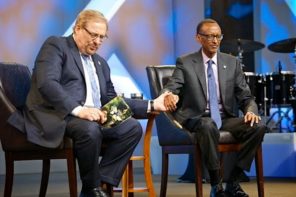Driscollpalooza (noun)
A series of offensive, hypermasculine, sexist, homophobic, classist, or downright bizarre things “Cussing Pastor” Mark Driscoll says, usually while promoting a new book, as well as the ensuing negative publicity and essays critical of Mark Driscoll, which somehow increase the popularity of Mark Driscoll’s new book.
Mark Driscoll has a new book coming out, and with suspiciously good timing, he’s managed to initiate back to back controversies. First, he showed up at John MacArthur’s “Strange Fire” conference uninvited and started a Twitter beef, which I wrote about last week. Then he posted an article alleging that pacifist Christians made Jesus out to be a “pansy” and that said Christians are probably going to hell. He’s aiming for the controversy trifecta at them moment by challenging MacArthur to a debate.
As I pointed out last week, and as Jonathan Merritt has articulated beautifully over at Religion News Service, these back-to-back controversies show us what a huge, awful hypocrite Mark Driscoll is. Driscoll spends half his time arguing that Christians need to be more inclusive, and the other half condeming a great portion of his fellow Christians to hell.
His new book, A Call to Resurgence, follows that script arguing that only 8% of Americans are “true evangelicals,” while simultaneously, and apparently without a hint of irony, calling on Christians to “stop fighting and unite.”
Driscoll’s nose for controversy has earned him a consistent presence in the news cycle, perhaps comparable only to Pat Robertson’s. But unlike Robertson, who’s generally regarded as a kook, Driscoll is stellar at leveraging his bad publicity into proof of his own faithfulness.
For example, after his planned appearance at Liberty University drew controversy, Driscoll described the incident simply as a “kerfuffle”, saying, “For the record, kerfuffles are nothing new. The first kerfuffle started when Jesus rose from death. He left Christianity in his wake and told us to love one another like brothers and sisters.”
Translation: I am controversial. You know who else was controversial? JESUS.
Here, Driscoll shows uncanny ability to turn criticism into proof of his own persecution, of his incredibly brave stand against his critics and for Jesus. Driscoll, rarely, if ever, directly engages his critics, preferring to note that there will always be critics who, out of sheer spite, attack great, godly men such as Driscoll.
This rhetorical strategy, despite being obvious malarkey, seems to be working really well (the irony that two of my past three posts focus on Driscoll is not lost on me). Despite all the bad publicity, Driscoll’s church continues to grow at an astronomical rate – the third fastest in the nation, and showing no signs of slowing down. And Driscoll has only tightened his control over recent years, pushing out dissenters and giving himself “executive elder” status, which makes him basically impossible to remove from his own church.
In this world, arguing against Driscoll becomes the ultimate no-win situation: you either agree with him, or, in disagreeing with him, you just prove how much the world is against him, and thus how godly he is. But Driscoll, in being so offensive, is also impossible to ignore, too exemplary of everything bad about conservative Christianity to not call out. Driscoll will thus continue to survive and thrive, not just despite the things he says and does, but because of them.




